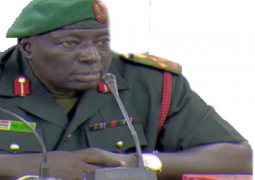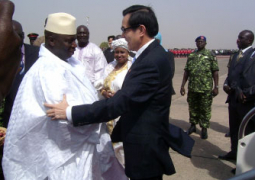More
than 60 per cent of the personnel of the National Intelligence Agency (NIA)
“are functionally illiterate” who can neither read nor understand English
language, according to a leaked petition from the agency.
The petition, written by Bubacarr A.M.O Badjie, legal adviser of the NIA – now referred to as the State Intelligence Services, has it that most of the functionally illiterate NIAs got their employment through nepotism for they were recruited by past and present NIA directors, former army generals and Pa Bojang, a cousin to former President Yahya Jammeh.
“Individuals who were brought by Pa Bojang comprise ‘Green Youth militants’ and other residents of former President Jammeh’s mother’s home,” Mr Badjie said in the petition, dated 22 May 2017, sent to the Office of the President and copied to the Gambia Bar Association, Inspector General of Police and Director General of NIA.
A copy of it has been obtained by The Point newspaper.
According to the petition, the usefulness of such people as NIA agents “is very insignificant as most of them cannot write comprehensive English language nor understand it”.
“Ordinarily, the first priority of the reform is to conduct a proper staff audit as writing is the working tool of the intelligence agents,” Mr Badjie said in the petition.
According to the legal adviser, the reform is not yet done and without it the NIA cannot contribute effectively to the crucial role a democratised intelligence service can play in the national security architecture to combat both traditional and emerging threats including terrorism, espionage, insurgency, sabotage, subversion, human trafficking, money laundering and illegal migration.
Spying on Barrow
According to the petition, during the campaign for the 2016 presidential election, an NIA security officer (name withheld) while on study leave “infiltrated the UDP party and even became a body guard to President Adama Barrow (when he was a candidate) during the campaign and during the political impasse and shortly after his assumption to the Office of the President.
The guy is now promoted from a security officer to an operative directly answerable to the director general of NIA.
Tampering evidence
According to the petition, the torture facility that the former director general of NIA, Yankuba Badjie, allegedly erected at the NIA Investigation Unit has been removed, “and the room repainted to remove stains of blood”.
“This act amounts to tampering with evidence as investigation was being done into death of Solo Sandeng, one of many individuals who had undergone torture there,” the petition stated. “[With] the removal of the torture facility at the Investigations Unit, there is risk other such facilities constructed at SIS Safe-houses’ will be removed too.”
“Relative to this is the fact that most of the individuals said to have been be involved in the torture of Solo Sandeng and his co-UDP supporters are reporting to work without facing any consequences for their actions,” it added.
In the petition, Badjie also alleged that prosecution witnesses, Lamin Jobarteh and Lamin Fatty, are now sent to outside postings, “thus making their attendance at the trial a daunting task”.
Nine former NIA officials, including the former director general, are currently facing murder charges for the killing of Solo Sandeng and at some point, the prosecution was hindered for lack of enough evidence.
According to Badjie, in his petition, President Barrow should have been informed about the human, material and financial resources of the NIA, including dissemination of personnel and property in The Gambia and outside.
But this was not done as of the time of writing the petition and Badjie feared that it is a signal that the NIA tradition of non-accountability could be maintained.
NIA legal adviser said he deemed it imperative to write the petition to bring to the attention of President Adama Barrow the “very little progress” made in the reform process of the NIA.




